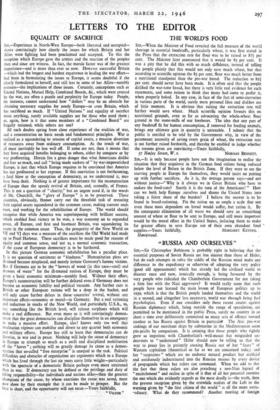THE WORLD'S FOOD
SIR, When the Minister of Food revealed the full measure of the world shortage in essential foodstuffs, particularly wheat, it was first stated in the Press that the extraction rate for flour was to be raised to 87# per cent. The Minister later announced that it would be 85 per cent. It was a pity that he did this with so much diffidence, instead of telling the people plainly that this would not only save much wheat, but that according to scientific opinion the 85 per cent. flour was much better from a nutritional standpoint than the pre-war bread. The reduction to 82} per cent. should never have been made. It is often said that the people disliked the war-time bread, but there is very little real evidence for such statements, and some reason to think that many had come to prefer it, when properly baked. In any case, in face of the fact of semi-starvation in various parts of the world, surely mere personal likes and dislikes are of little moment. It is obvious that raising the extraction rate still further would save wheat. Much scientific opinion favours this on nutritional grounds, even as far as advocating the whole-wheat flour ground in the stone-mills of our forebears. The idea that any part of any foodstuff fit for human consumption, if removed for feeding animals, brings any ultimate gain in quantity is untenable. I submit that the public is entitled to be told by the Government why, in view of the paramount necessity of saving every grain of wheat, the extraction rate is not further raised forthwith, and thereby be enabled to judge whether the reasons given are convincing.—Yours faithfully, 57 Harley Street, W.7. NORMAN BENNETT.
SIR,—It is only because people have not the imagination to realise the situation that they acquiesce in the German food rations being reduced below the level of Belsen in the British Zone. If they were to see the starving people in Europe for themselves, they would insist on putting up with further sacrifices. As ;t is, the average person says—and not without justice—" Why is it always we in Great Britain who have to endure the food-cuts? Surely it is the turn of the Americans! " How can we both help Europe ourselves and shame the United States into taking a fairer share of the burden? I believe the answer is to be found in bread-rationing. Fix the ration on so ample a scale that not even those most dependent on bread would suffer, but ration it. By the consequent elimination of all waste we should save an astonishing amount of wheat or flour to be sent to Europe, and still more important would be the moral effect in the United States, inducing them to make far greater efforts to save Europe out of their own abundant food






























 Previous page
Previous page